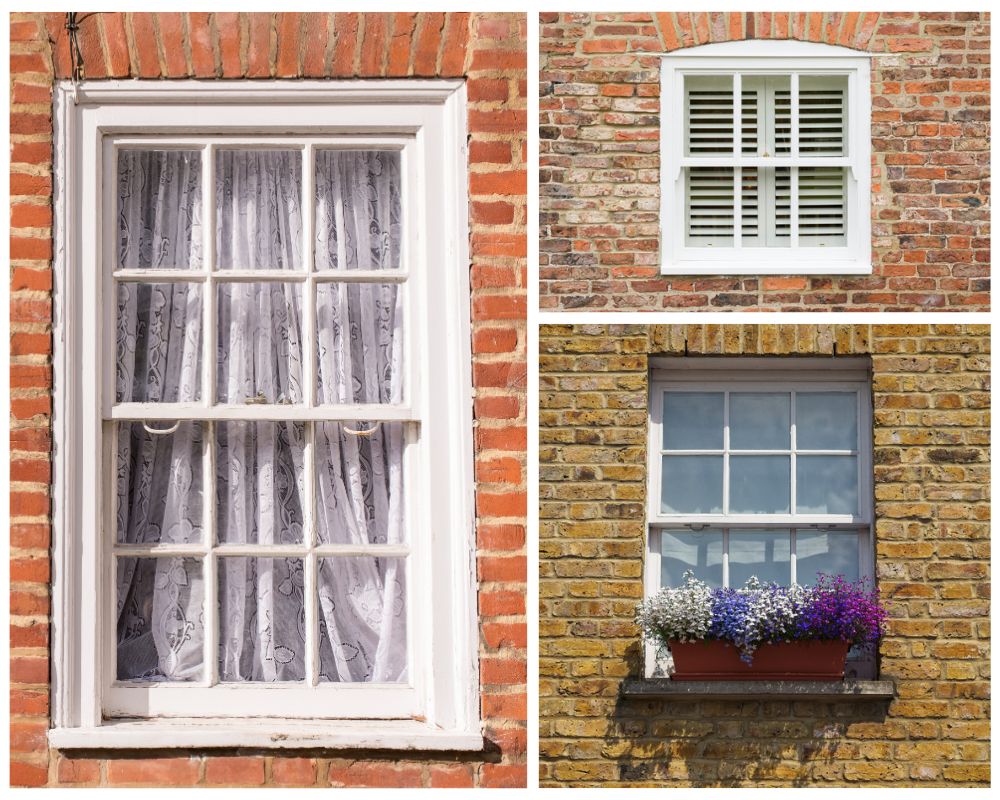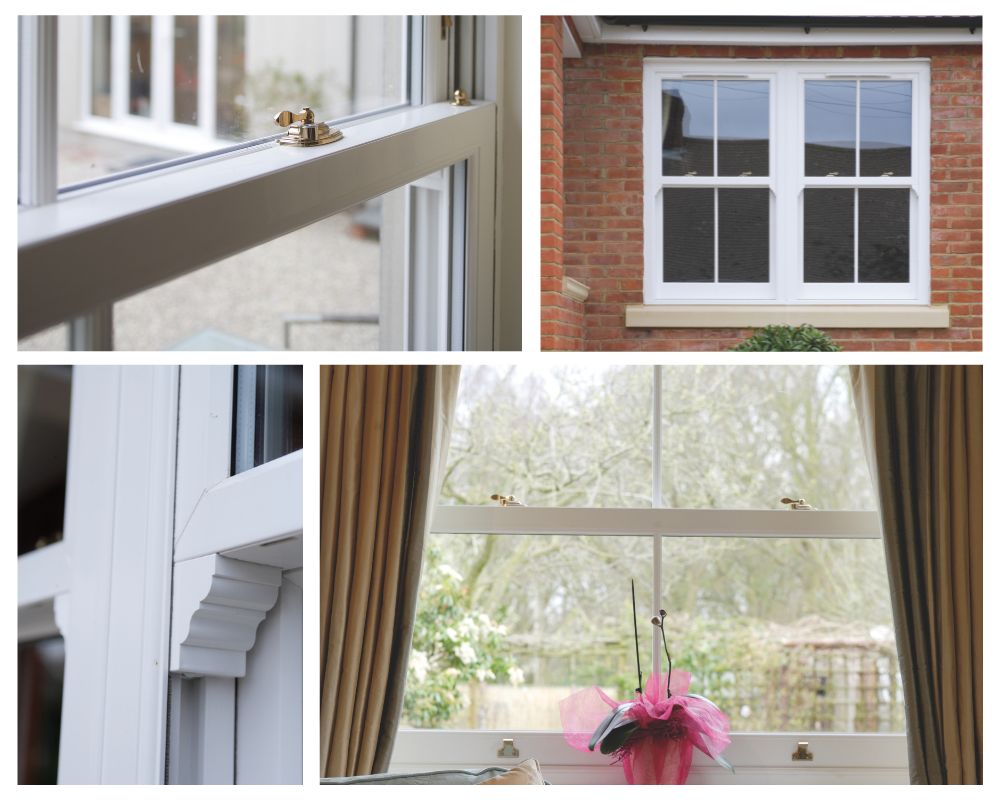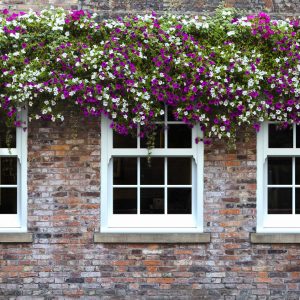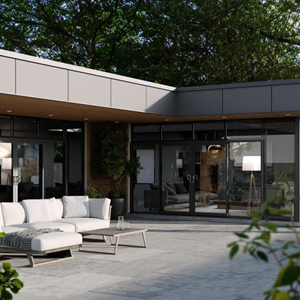Traditional Box Sash Windows
Share this story!
Share this post to any popular social media, email it to a friend or print it off.
Traditional box sash windows are a quintessential feature of British architecture, admired for their timeless appeal and functionality. These windows have graced homes across the UK for centuries, offering a blend of beauty and practicality that continues to be cherished today. Below, we explore what makes box sash windows unique, discuss the process of replacing them, and examine the lasting appeal of traditional sash window frames.
What is a Box Sash Window?
A box sash window is a type of window that consists of one or more movable sashes, which slide vertically within a frame. The term “box” refers to the hollow frame that houses the pulleys, weights, and cords that allow the sashes to move smoothly. This clever counterbalance system is a hallmark of the design, ensuring that the windows can be easily opened and closed while staying in place at any height.
Box sash windows were first introduced in the late 17th century and quickly became popular due to their practical advantages. Unlike casement windows, which open outward or inward, sash windows save outward or inward space, and some say they are less susceptible to wind damage. They also offer excellent ventilation control, allowing homeowners to adjust the opening size to regulate airflow.

Box Sash Window Replacements
While traditional box sash windows are durable, the ravages of time can take their toll. Many homeowners with period properties face the challenge of replacing old, rotten or damaged sash windows while preserving the historical character of their homes. Fortunately, modern technology has made it possible to replicate the look and feel of original sash windows while improving their performance.
When replacing box sash windows, we believe it’s important to choose materials and designs that respect the architectural integrity of the building. Timber is the preferred choice for many, simply because it’s a like for like replacement. However, uPVC has taken the heritage market by storm, and has become a popular choice for those seeking lower maintenance solutions or enhanced energy efficiency, whilst still being able to replicate historical details.
Modern replacements often incorporate double glazing, which significantly improves thermal insulation without compromising the traditional appearance. Draught-proofing, another modern advancement, can be seamlessly integrated into the design, potentially reducing energy costs and increasing comfort while maintaining the classic charm of sash windows.
Wondering how to expertly replace box sash windows? We’ve put together an extensive sash window installation guide on our website!

Traditional Sash Window Frames
Traditional sash window frames have long been celebrated for their elegance and contribution to the classic aesthetic of British homes. Historically, these frames were crafted from timber, a material prized for its natural beauty, durability, and workability. Timber sash windows became a defining feature of British architecture from the Georgian and Victorian periods, offering a timeless charm that has endured for centuries.
Timber Sash Window Frames
In the past, traditional sash window frames were meticulously handcrafted from high-quality timber, often using woods like oak or pine. Oak was favoured for its strength and resistance to rot, while pine was commonly used for its availability and ease of shaping. The craftsmanship involved in creating these frames was highly skilled, with joiners carefully shaping the wood into detailed profiles and mouldings that gave each window its unique character.
These timber frames were designed to be both functional and aesthetically pleasing. The wood was painted to protect it from the elements and to match the architectural style of the building. Over time, however, timber sash windows often suffer from issues such as rot, warping, and draughts, particularly if they are not regularly maintained.


The Rise of uPVC Sash Window Frames
While timber remains a popular choice for sash window frames in period properties, advancements in materials technology have led to the rise of uPVC as a more efficient and practical alternative. uPVC is a durable, low-maintenance material that offers several advantages over traditional timber. uPVC windows are also highly resistant to rot, and they will not require regular sanding down and repainting like timber frames.
One of the most significant benefits of uPVC sash window frames is their superior energy efficiency. Modern uPVC sash windows are available with double glazing, providing excellent thermal insulation and which may help to reduce energy bills. At Quickslide, we’ve launched an upgrade to our uPVC sliding sash windows that will achieve an incredible 1.2 W/m²K, and we’re excited to be leading the way in energy efficient sash window design. Get all the details on our latest development: 1.2 U-Value Available Now For uPVC Sash Windows
Despite being a modern material, uPVC can achieve a heritage look that closely resembles traditional timber sash windows. Here at Quickslide we can manufacture uPVC frames with wood-effect finishes, allowing homeowners to enjoy the classic appearance of timber without the associated upkeep. These finishes can replicate the grain and colour of wood, making it difficult to distinguish uPVC sash windows from their timber counterparts at a glance. By choosing woodgrain foils over real wood, homeowners are reducing the demand for timber, which helps conserve natural forests. We also offer a range of heritage features, including our new 37mm slim midrail for an even more authentic touch.
Furthermore, uPVC sash windows can be customised to match the original design and proportions of historical windows, ensuring that the architectural integrity of a period property is preserved. This makes them an attractive option for homeowners who want the look of traditional sash windows but with the added benefits of modern efficiency and convenience.
Traditional box sash windows are more than just a functional feature; they are an enduring symbol of British architectural heritage. Whether preserving original windows or opting for modern replacements, homeowners can enjoy the beauty, charm, and practicality that these windows bring to any property. The combination of historical craftsmanship and modern innovation ensures that box sash windows will continue to be a cherished element of British homes for generations to come. Get a trade price now, or find an installer today. For more information, call us on 03332 412 240.
You May Also Be Interested In:
- Comparing uPVC Sash Windows vs Wooden Double Glazed Sash Windows
- How Quickslide Replicate Traditional Timber Windows
- 3 Traditional Sash Windows from different eras
- Ways To Maintain Sliding Sash Windows
- 4 Historical Styles of Sliding Sash Windows
Please note, our news articles are relevant and accurate at the time of release, but as technical developments dictate, and times goes by the information in this article may no longer be applicable. If you have questions, please contact us using our online contact form or call us on 03332 412 240.



